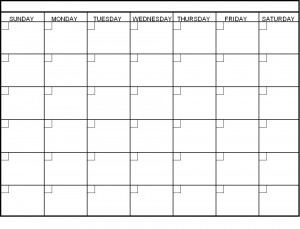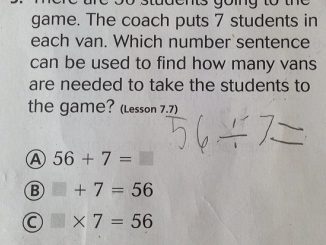
 Why go to school for nine months when you can compress it into six weeks of summer school for full credit?
Why go to school for nine months when you can compress it into six weeks of summer school for full credit?
Why teach how we teach and not focus on one area for six weeks at a time? Six weeks of Algebra. Six weeks of US History . Six weeks of French. Six weeks of Ancient History. Six weeks of Latin. Six weeks of Chemistry. Six weeks of Grammar. Six weeks of Physics. Six weeks of Language Arts. Six weeks of basic emergency first aid. Six weeks of phonics and learning the alphabet and numbers, if you happen to be six.
I bet kids would be more responsive to school that way. I know I would have been. Every year I watched my grades go up and down depending on what we were studying. Every year I spent six weeks in summer school in one subject or another. And every year that teacher asked what I was doing there, they couldn’t fathom why I was in summer school, comprehending the material, getting As, minding my own and not being a “behavior problem”.
Because “six weeks” is digestible! “Six weeks” is easy! There is an obvious end in sight. it’s compressed into bite sized courses where you aren’t splitting your focus into seven different areas. I think people, not just children, would learn, comprehend, and remember more using a system like this. I feel like I remember more from those summer school sessions than I do of year long regular school sessions.
When I was homeschooling, and collecting/putting together study units, they were in bite sized pieces. A week here, two weeks there, all the way up to, you guessed it, six weeks! And that’s all we did for those weeks. Did you know that studying science, and only science, includes language, math, spelling, and possibly even geography? Every subject is already so interconnected, why waste time splitting them up into daily subjects that are not coordinated? Applied mathematics made so much more sense to me than “plain old algebra”. I failed algebra spectacularly, but I aced chemistry. Same math, different application. I never got beyond algebra/geometry but I excelled in physics.
When I’m cooking, am I not adding fractions, diving fractions, learning about chemical interactions, and taking a home ec course?
Why not revolutionize learning? Six weeks on one class, four hours a day, an hour for lunch, an hour of independent study (for those who still need their kids to be in a six-hour day) and then a week of break. Year round! Want to take summer off? Sure! You get your eight weeks, same as you get now. Summer will offer make up courses or the opportunity to take a challenge course or an extra language or pottery instead of being core classes.
I think it has merit. I think more children would succeed in a program like this than currently do in the same old system we’ve used forever. New math? Why not teach applied math? New ways to learn a language? Why not immerse in it for six weeks? New ways to teach about nature? Why not plan a class camping trip for a week to a local park? Spend two weeks learning about outdoor survival, fishing, cooking, foliage identification, foraging? Then camp for a week. Then spend the next three weeks learning about what you observed. How trees grow. How they exchange CO2 for O2. How photosynthesis really works. How their canopy gives protection to the plants and wildlife below. How do the fish you caught and ate contribute to the ecosystem? It’s not all boring worksheets and abstract thinking. In six weeks you’ve learned about the ecosystem, about cooking, about the food cycle, about foraging (which could lead into discussions about the development of farming!), about the food chain, about sustainable living, about not littering, and fifty other topics I could spout off of the top of my head. It would be an all-inclusive unit of study disguised as a camping trip. It would be fun.
I wish I had a million dollars and a building. I would open a school. I would hold multi-aged classes based on ability. They would be in six-week units. We could offer as many six weeks units as we had teachers and interest. Core classes would be on a schedule. Certain terms would always start certain units, so you can always start some sort of science class, or US History, or Government, or Foreign Affairs, or whatever else falls under “core” classes. There would always be a reading class going on, but maybe it would pick a new book (or two, or three) to focus on each term. Additional learning would revolve around the chosen book, but it would always include grammar, reading comprehension, and spelling. I don’t know. It’s amazing in my head. It works. It’s interesting. It’s captured my interest this morning and I’m having a hard time not pretend-planning this amazing dream school system. I believe it would be amazing. Does anyone have a million dollars and a building to lend me?




This! I remember those random times in my school days when subjects happened to overlap…those are the times I really became interested and flourished! I feel like all the schools really do are teach kids to sit still and memorize facts without giving them any insight into how these things apply to the real world, and it ends up turning kids off learning. I was lucky enough to have parents that fostered a love of knowledge and taught us things at home that we weren’t getting in school, but not every child has that advantage. I would love to see schools adopt a mode of teaching that is centered around the way children actually learn!
Is it not the best concept? If I head more of a head for business and for teaching, and thought I could actually secure funding I would totally see about doing something like this.
We do a lot of “extra curricular learning” because I feel like the schools leave out a lot (but teach a lot that I can’t handle as a home-schooler).
I realize I do a lot of ranting about schooling, but it is so lacking! And so biased! I feel like my kids are learning less than I did in public school, or are learning things that have no bearing on future useful skills.